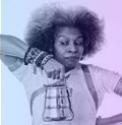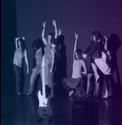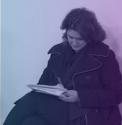The mother question
I am Viviana Bovino from Laboratorio Internacional Residui Teatro.
To begin with, I would like to express my deepest gratitude for the invitation to participate in this circle dedicated to women in groups of theatre.
My presence here responds to Julia Varley's clear intention to give voice to the women who represent another generation within the Magdalena Project movement, born in 1986. For this reason, in my speech I will not speak only on behalf of myself or my group. As I promised yesterday to my colleagues during the International Meeting "Magdalenas of Europe and America", my intention is to give voice to some of the concerns that move us all.
When Julia Varley invited me, I thought that this meeting would be an opportunity to be the bearer of other perspectives. I decided to focus on one particular question, the "mother question", the one that gives rise to other questions; and this is something we have reflected on extensively with Jill Greenhalgh, one of the founders of the Magdalena Project.
Searching like a surgeon among questions, I came to focus on one: "What is the most compelling contribution that women creators of our generation are making within our groups?"
At first, I wanted to put it directly to my colleagues, but then I understood that they were immersed in their work and that perhaps the time had come to stop and listen.
Fortunately, I have had many opportunities to observe during the Magdalena Project meetings in which I have participated in the last year, as well as in the Transitable Theater Territories Meeting 2024, which our group organized in Madrid and in which many of us were present.
What I have observed is that some of us still feel the need to assert ourselves, to speak loudly and firmly, showing strength and hiding vulnerability in an attempt to be heard and recognized. In many cases, this reproduces a communicative model that they have seen their peers employ in leadership roles. However, the vast majority of us are seeking to focus on another communicative model, which we consider to be one of the fundamental axes for transforming the patriarchal paradigm to which we are unfortunately still exposed.
I like to think that we are assuming one of the principles of the Gunadule communities (original people from Colombia), who with the wisdom of those who know how to be simple and direct, say that it is important to "speak well and beautifully".
To speak well, because we must speak with meaning, with knowledge based on experience, on exchange, with awareness. But also beautiful, because it is essential to choose words with care and sensitivity, seeking, above all, an encounter with the other.
Making our words resonate with the other person. "Resonate" is a beautiful word, it comes from the Latin resonantia, which means 'echo' and has its origin in the field of acoustics. In "sympathetic resonance," for example, a passive string begins to vibrate and produce sound when we vibrate another string that has harmonic similarities. So the question is not only the content of what we say, but the resonance, the new polyphony that we are creating when we talk to our interlocutor.
For women, the communicative preconditions are peculiar. They require a different set of attitudes and circumstances than men. If a man proposes an initiative, he must be convinced of what he wants and seek allies. In addition to complying with these two points, we must also demonstrate that we can, that we are capable, that we have the experience and capacity to lead and manage.
We represent many other realities that, by stereotype, nature or sequence, are associated with women: mothers, migrants, racialized, Afro-descendants, in vulnerable or violent situations. For this reason, we do not walk alone. All these collectives that each and every one of us represents are moving forward with us.
Within the Magdalena Project, the women of the new generation are emphasizing this point. Our objective has been to self-define and self-legitimize ourselves as women, as a movement and as a group of groups. We are a cross-cutting, intergenerational, interdisciplinary and intercultural group; a representation of the communities that co-exist in society. As Jill Greenhalgh says, we must create space for ourselves, and the first space we must open is in our own minds. Moreover, by making space for one, we are gaining space for all.
In this transversality of Magdalena, we also include the new generations, whom we care for, whether or not they are our offspring. We are working more and more to guarantee spaces in which access to babies is contemplated and guaranteed. The artistic community must reflect on this very specific issue: groups are inclusive, we must be prepared to welcome girls and boys. Designing work, learning and creative spaces adapted to children means creating adequate spaces for everyone. This prevents artists who are mothers from being excluded from the art world. The new generations place great emphasis on this point and claim, precisely, the importance of an intergenerational approach.
We are also creating spaces for young artists to have visibility and influence in decision making, with the support and mentoring of the Magdalenas who have been in the movement the longest, whom we call the grandmothers. This practice is part of a careful transmission that they have systematically carried out, guaranteeing cohesion and sincere collaboration, strengthening both individual and collective work.
Defending what has been won
As I said before, the word woman includes many other concepts, among them is also the one of being a victim. Unfortunately, when asked if someone has suffered harassment or violence, the vast majority of us are still the ones who raise our hands. For a while we believed that we had won certain rights, but we realize that we must continue to defend them and that to achieve this we have to stand together. A change of government can set us back decades in a matter of days.
The women of "Magdalena Second Generation" recently commented on the sudden deterioration of the situation in Argentina with the presidency of Milei. In Europe, from Spain, Germany, Italy and Serbia, we deplore the rise of sexist discourses pro- moted by the extreme right, which feed a narrative based on hatred.
In Brazil, Daniela Santana (Grupo Contadores de Mentiras) and Bárbara Luci Carvalho Fonseca (Antagon TeatrAktion, Germany) defend the importance of creating safe spaces for learning and for community exchange; spaces of osmosis between art and activism in which to remember, to repeat the same words. Places that make us feel accompanied, and that theater is the vehicle to achieve this and defend our rights.
Our body is a territory crossed by many other experiences. We experience firsthand the changes that take place in us, in our creativity, changes that are tangible proof of a great truth: everything changes, everything is transformed.
Accepting our own vulnerability and impermanence gives us the capacity to listen to the diversities that are manifested in each society and makes us bearers of all those othernesses that coexist.
Being mothers, living through menarche and menopause, migrating, welcoming, listening, sharing, are concrete experiences that intersect with our being creators.
The need to follow the times of our bodies, to adapt to them, to seek strategies to accompany the changes that take place in us, in our energy, in our speed, in our individuality when other beings are born from our wombs who need us, allow us to see and understand other collectives, to dialogue with them through the arts.
Many of us have initiated projects that seek to use artistic tools with different collectives: with girls and young mothers in rural areas (Maristella Martella, Tarantarte), with children (Irini Sfyri, LIRT), with women and minors in prison (Veronica Ragusa), with communities in peripheral neighborhoods of the cities (Silvia Moreno, Cavaluna Teatro), with young people (Giovanna Michaliadi Sarti, Fabrica Athens) and with intergenerational groups of women (Parvathy Baul/India; Nora Gonzalez of Teatro La Candelaria, among others).
The word woman often comes with the word migrant or refugee, and that is why in our meetings we seek to open spaces for reflection and, as Amaranta Osorio (Mexico/Colombia/France) always reminds us, to give back to other women the support we once received ourselves. Giving each other a hand, weaving a web that we like to imagine as a "secret garden", as mentioned by Geddy Aniksdal in the documentary directed by Lunia Film: "SECRET GARDEN - Women Creators in Performing Arts".
Our body is a territory crossed by many other bodies. That is why this woman of group theater has become the bearer of all these othernesses that coexist in the society in which we live.
Our reflections
We talk a lot about safe space. But what does safe space really mean? Especially when we refer to making room for vulnerability or working with diverse communities, we wonder: what are the principles of theater that can help us on this path?
We consider the possibility of creating with a smile, with joy, with happiness, with the party mentioned by Patricia Ariza from Teatro La Candelaria (Colombia).
My yoga master, Apeksha Bhagwat, says, "A mind that wanders is a life that wanders." However, creating with joy does not mean creating with distraction, quite the opposite.
As women creators of this generation, we wonder if creating with joy can be considered a ramble digression, if smiling during rehearsals can be seen as a distraction that colludes with certain practices of seriousness and rigidity disguised as respect, practices that have predominated in theater groups and that have left no room for other forms of creation.
I think about it and the broad smile of Natalia Tesone, of Magdalena Second Generation Argentina), or of Daniela Santana resonates in me, as well as the certainty that these smiles can be part of the artistic process in which we are immersed. Creating from the party, as a community ritual or as a device for the manifestation of existence.
Leave a trace and document
We are investing our energies in leaving a mark, in writing and documenting our work. We want the meetings to be recorded, we want the interventions to be recorded and we want to guarantee the presence of researchers, journalists, academics and publishers, with the intention of adding allies.
I am leading a meeting in Spain and I have decided to entrust the video documentation to two men: Luca Ciriello and Claudio Coloberti. For me, this is a metaphor for the dialogue we are opening: a reflection on a new masculinity that is allied, that is in transformation.
There are men who are accompanying this change. They are learning to learn from listening, from silence and observation. They are the ones who are supporting us in this act of taking space.
I would like to close by saying that we are proceeding with an improvisation on principles, in which we are taking the reins not only on an artistic level, but also on an organizational level, drawing a new world map in which we are adding pieces that until now had no space.
Sometimes, among ourselves, we talk about organizational and management strategies. I am a mother and I owe much of what I am today as a woman and artist to my daughter Alma.
I like to think that when women lead, what we are really doing is accompanying individuals and groups in the delicate and powerful act of giving birth.
Viviana Bovino
Laboratorio Internacional Residui Teatro



